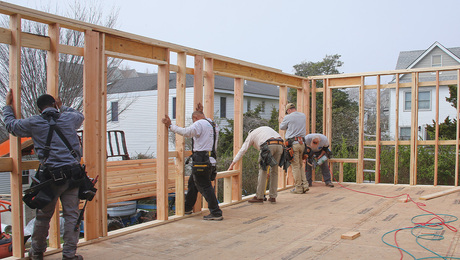Does anyone have information on “on demand” water heaters? Do they work? Are there pitfalls? This would be to replace a natural gas 50 gal heater and I’d like to keep it gas if possible.
Discussion Forum
Discussion Forum
Up Next
Video Shorts
Featured Story

A rear addition provides a small-scale example of how to frame efficiently.
Featured Video
Builder’s Advocate: An Interview With ViewrailRelated Stories
Highlights
"I have learned so much thanks to the searchable articles on the FHB website. I can confidently say that I expect to be a life-long subscriber." - M.K.
Fine Homebuilding Magazine
- Home Group
- Antique Trader
- Arts & Crafts Homes
- Bank Note Reporter
- Cabin Life
- Cuisine at Home
- Fine Gardening
- Fine Woodworking
- Green Building Advisor
- Garden Gate
- Horticulture
- Keep Craft Alive
- Log Home Living
- Military Trader/Vehicles
- Numismatic News
- Numismaster
- Old Cars Weekly
- Old House Journal
- Period Homes
- Popular Woodworking
- Script
- ShopNotes
- Sports Collectors Digest
- Threads
- Timber Home Living
- Traditional Building
- Woodsmith
- World Coin News
- Writer's Digest


















Replies
Dollar: Yes, on-demand hot water heaters (HWH) work. They have pluses and minuses compared to tanked HWHs. Pluses: no standby losses. less floor space is needed. You can take a continuous shower or fill the hot tub and never run out of water.
Minuses: On-demands require a bigger flue (do NOT cheat on this!!), they don't keep up with more than one user at a time unless you get a huge one, most of them need a minimum flow to kick on, therefore you get no HW at low flows. They differ in their ability to modulate their heat rate (i.e. to hold a constant output temperature). On-demands are more expensive. They are less understood by some plumbers.
You should stay with gas, whatever you do. There are electric on-demand HWHs, but they should only be used in lieu of an electric tanked heater. A gas-fired heater (of either type) will be far cheaper to operate than an electric in almost all areas of the country. Caveat: I might use an electric for a remote room with miminal water usage (guest bathroom? employee hand-washing sink, etc.).
David,
Thanks. I appreciate the input.
$ Bill
Check out the Rinnai heaters. A builder friend of mine puts them in all his jobs. I'm putting one in my house next month. They can mount on the exterior wall of the house (saving the cost of interior floor space), and have a flow rate high enough for my house (2 bathrooms, kitchen, laundry) at over 6gpm. Takes a 3/4" gas supply line. Installation must be done by a plumber who has taken their certification course.
Hey y'all, check out the thread called "Aquastar water heater" just below this one.
Tom
yeah... but then they might see my posts...
oh wait... maybe you think my points are not valid?
actually my purpose of posting here was to get your feedback on what I posted last over there. I was enjoying the discussion then you left....
WHW,
I'm a pretty inconsistent visitor to this forum. I post consistently when I don't have work. Hmm...I'll go back to the other thread now. Tom
Dear DollarB2. We have installed a Rennai, the largest model and have not had any problems. We saved space, we have constant hot water, running water for 4 adults and one child. We have the internal model, rather than mounting on the outside of the wall. We made that choice because that was what we were familiar with. The technology is very widely used in Europe. Although the cost was high I calculate that over the period of 25 years (the suggested life of the Rennai) we will break even.
Replacement water heaters versus instant heater. Agree with the comments about the electric ones. They don't heat enough water fast enough and are expensive.